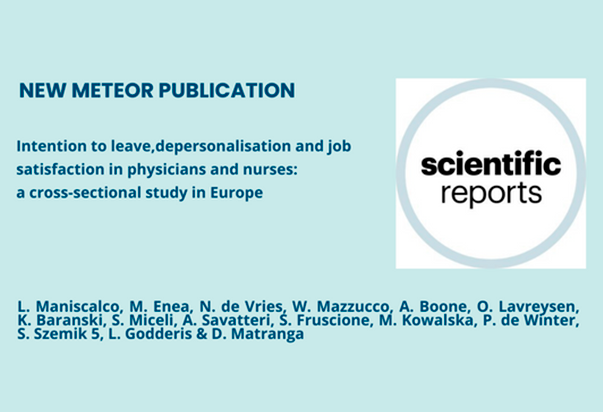The European healthcare sector faces a deepening staffing crisis as almost one in ten doctors and even more nurses intend to leave their professions, a study from the EU-funded Project METEOR found. The researchers also identify the reasons why employees quit, which can help governments and hospital administrators combat the trend.
In an article published in Scientific Reports Journal, METEOR researchers discuss the results of a survey they conducted among staff of eight hospitals in four countries, which shows 9% of doctors and nearly 14% of nurses declared their intention to leave their profession, citing low job satisfaction, growing depersonalisation, and emotional exhaustion as the primary factors influencing their decisions.
The turnover crisis comes as the sector struggles with an existing shortage of medical personnel. Projections from the World Health Organization indicate that in six years, Europe will need 18.2 million healthcare workers to meet the growing demand for healthcare services driven by an ageing population and increased prevalence of chronic diseases.
“European hospitals are already struggling with vacancies, and it’s worrying that so many doctors and nurses are considering leaving their profession,” said Domenica Matranga, a professor at the University of Palermo (UNIPA) and co-author of the study. “We cannot afford to lose these people, so we need to find out what to do to keep them.”
METEOR researchers conducted a cross-sectional survey that gathered answers from 381 physicians and 1,351 nurses at hospitals in Belgium, the Netherlands, Italy, and Poland. The questionnaire consisted of 76 questions about participants’ intention to exit the profession, intentions to leave their current hospital and the factors that influenced their decision to quit.
The survey also revealed that there is a large group of healthcare professionals who are dissatisfied with their current employer. More doctors than nurses are considering leaving their current jobs, with rates of 16.3% versus 8.4% respectively.
“Many doctors want to leave their current workplaces because of the management and personal issues,” said UNIPA’s Laura Maniscalco, a co-author of the paper. “In the high-stress environment of a hospital, they can face challenges in terms of work-life balance or conflicts that can result in bullying. Additionally, the ineffectiveness of the management system and understaffing can force them to work in areas outside of their expertise, leading to role conflicts and reducing opportunities for career advancement.”
Nurses showed a higher intention to leave the profession than to change their workplace. This situation can be explained by a rapid decline in working conditions during the Covid-19 pandemic. Respondents said dealing with death, stigmatisation, and the risk of infection were the crucial factors increasing their stress.
“Our research suggests that nurses may no longer find their job rewarding or valued,” Matranga said. “This issue is connected with relatively low salaries, tough working conditions and, of course, the physical and emotional pressure caused by the pandemic.”
The authors urge healthcare managers to devise effective retention strategies, taking into account job satisfaction, work engagement, and a positive working climate. Such internal policies are crucial, given the difficulty of finding replacements for departing professionals.
The full article can be read here.



